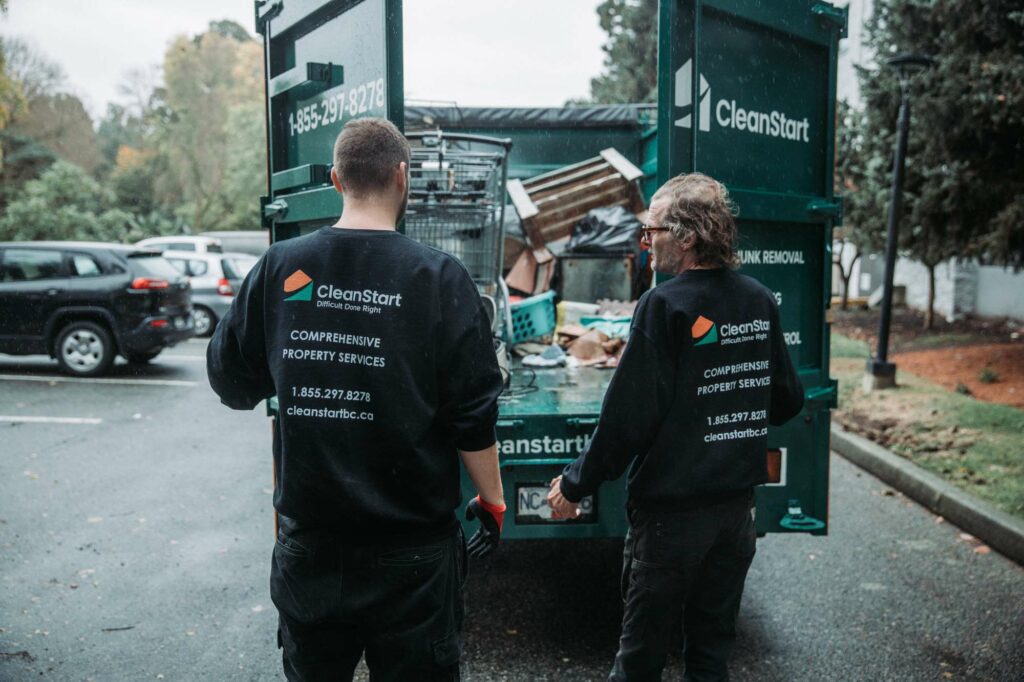How To Dispose of Hazardous Waste

CleanStart Property Service offers some biohazard clean-up services, extreme cleaning services, as well as junk removal and hoarding support in the Lower Mainland of British Columbia. We are often asked how to dispose of hazardous waste products, and our friends at Junk Ninja wrote this great article that answer a lot of those questions, you can find the full article here: https://junkninja.ca/how-to-dispose-of-hazardous-waste-in-ottawa/
When we hear the term “hazardous waste,” the image of large containers with big, yellow caution signs appears in our minds. Many people have the misconception that hazardous waste can only be found in factories or specialized facilities, and that’s all thanks to the entertainment industry. Although hazardous waste can indeed be found in those large containers, you can surely find hazardous material in your own home. All homes have at least one item that can be considered dangerous, which leads us to the question of the day “ What is considered hazardous and how can we dispose of it safely?”
What Qualifies as Hazardous Waste?
Before getting into what qualifies as hazardous waste, you must understand what hazardous waste is. In the simplest terms, hazardous waste is waste with properties that make it dangerous and is capable of having a harmful effect on human health and the environment. Such waste is created from many sources and can come in liquid, solid, or gas forms. Hazardous waste is identified based on its physical, chemical, and biological properties. Using these properties, the Environmental Protection Agency (EPA) came up with four characteristics that can help you identify hazardous waste: ignitability, corrosivity, reactivity, and toxicity.
Ignitable waste burns at low temperatures, causing an immediate fire hazard. This type of waste comes in three forms: materials that burn at a low temperature, solids that spontaneously combust, and oxidizers and compressed gas. Some examples include alcohol, gasoline, and aerosol cans.
Corrosive wastes include strong acidic or alkaline substances. Any liquid that has a pH of under 2 is considered corrosive and can eat through containers, causing leakage of harmful matter. Battery acid, which is found in every household, is considered corrosive, which is why dead batteries should be disposed of safely.
Reactive waste is waste that is chemically unstable and reacts violently with air or water, causing explosions or the formation of toxic vapors. Any waste containing sulfide is considered hazardous because of how violently it reacts with oxygen. Toxic waste is poisonous and can cause severe illness, even if a person is exposed to trace amounts. This is the most common form of hazardous material that can be found in your home, some examples being solvent-based paints, cleaning chemicals, and garden pesticides.
There are symbols placed on hazardous materials that indicate whether they are reactive, corrosive, flammable, or toxic.
How to Dispose of Hazardous Waste
After living in a home for a few years, people are bound to collect a variety of materials that you don’t necessarily need anymore, some of those materials being hazardous.
Unlike the things you can simply put in a trash bin, hazardous waste disposal is slightly more complicated. If not disposed of properly, hazardous waste can be a great danger to people, animals, and the environment. Read the labels of the hazardous products. Along with the appropriate danger symbol, there may be instructions on how to dispose of the item, or at least what they can and cannot come in contact with.
After determining what you can and cannot dispose of yourself, contact your local waste management company and schedule a pickup for your hazardous material.
You will be provided with instructions on how to sort and store the items until the date of the pickup.
If at-home pick-up is not possible for you, then hazardous waste drop-off sites are also available. There is a set schedule that outlines certain days and times of the month you can come and drop off your waste.
Be sure to call ahead of time to learn the specifics and if there is certain material that is not allowed to be dropped off.
Some materials, like paint, can be donated to someone who needs them. Charities and organizations like Habitat for Humanity accept these materials and use them in their remodeling projects. Other items like fertilizer and motor oil can also be donated.


